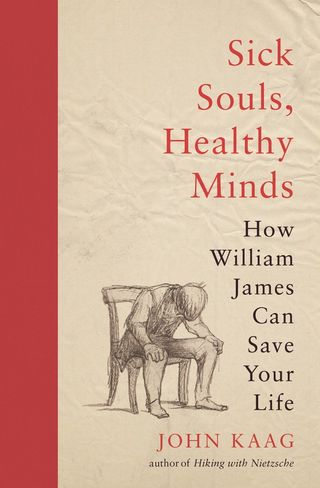Relationships
Why You Need to Believe That Others Can Love You
Sometimes we have to believe in things that we cannot prove to be true.
Posted March 26, 2020

I’ve been reading John Kaag’s masterful new book Sick Souls, Healthy Minds, in which he presents the humanistic philosophy and psychology of William James in the context of James's life as well as Kaag’s own. The book is truly a pleasure to read: Kaag’s writing flows smoothly throughout, blending James’ history and thought with our contemporary malaise, and pointing us towards a way out if we choose to take it.
There are many passages in the book worth highlighting, but one in particular is relevant to the discussions on this blog of self-loathing and feelings of inadequacy, especially as they relate to love and relationships.
In Chapter 2, “Freedom and Life,” Kaag explains how James came to believe in free will, or at least the practical importance of believing in free will. Kaag characterizes this belief as an act of faith, similar to religious belief, one that reinforces and eventually confirms itself. In the end, this belief provides value and comfort to the believer, even if it can never be empirically confirmed.
Kaag then ties this approach to faith to love itself:
Falling in love and believing in free will are not all that different. Both are radical, life-altering, working hypotheses, verified or disproved in experience. Both involve the type of belief that one must assent to in an initial act of (basically blind) faith. As a friend once said to me, falling in love, at first, entails no small amount of self-deception, a willingness to act as if you have “all the facts” about your beloved, when in fact you don’t. (pp. 54-55)
There is another way in which we must have faith when falling in love: We must believe that the other person can love us. This is a difficult task for many of us, but especially those who feel inadequate in general. William James experienced this internal conflict when he met Ms. Alice Gibbens and struggled with his desire to be with her. As Kaag writes,
James had spent much of his life believing that he was dispositionally unfit for marriage. He was too weak, too sickly, too psychologically unstable, to be a good partner to anyone. How could he ask anyone else to permanently bear his company when he could hardly stand himself? (p. 58)
Despite these misgivings, James did propose to Gibbens—who accepted gladly, although he tried to warn her against him.
This behavior and the feelings on which it's based should be familiar to readers of my posts on self-loathing and love. For example, Kaag explains that those who remain “disengaged by choice” may find it impossible to believe “that someone else would be willing to fall in love with us” (p. 58), the fundamental issue with self-loathers when it comes to forming meaningful romantic relationships.
Twenty years after he met Gibbens, James spoke about self-validating beliefs in “The Will to Believe,” a lecture that Kaag argues is as much about love as free will or God. As Kaag explains it, we never know with certainty, especially in the early stage of attraction and infatuation, if our love will be reciprocated. However, we need to maintain this belief before we can take the chance, or “make our move,” that's necessary to find out if it's true. If we never take this chance, we’ll never know if our affections could have been returned—and, even more important, they never will be. The belief is necessary to bring about the reality, in the same way that we need to believe we can do anything before we can actually do it, even if such a belief is not based on any reliable evidence.
All of this is consistent with my conclusion in most of my posts on self-loathing and love that we need to trust that others can and do love us, that they can see something in ourselves that we can’t imagine and that we deserve their love. Of course, this is not only an issue at the early stages of a relationship; the self-loathing often find it difficult to sustain the belief that their partners love them, leading to irrational fears that their partners will leave them after the slightest negative incident, all too often endangering the relationship itself with little justification.
Furthermore, this trust (or faith) needs to be maintained throughout the relationship. In a way, this should be easier after the relationship getting going, because the partners shouldn’t have to assume how they feel about each other—hopefully, they’ll tell or show each other, although some are better at this than others. Although the self-loather may still find it hard to believe their partner’s affections are sincere and justified, even if they’re told often, at least they have more evidence on which to base the trust or faith necessary to keep the relationship going.
What this shows is that William James’s “will to believe” never stops being important, even well into a relationship, because we can never know with absolute certainty that our partners love us. We have to believe they love us—more precisely, we have to choose to believe them, a choice that is an essential part of loving and being loved.




